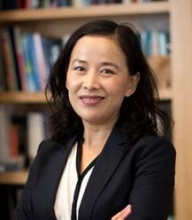MSE 298 Seminar Lecture (Zoom): The Art of Layering Apples and Oranges - Hybrid Material Designs Toward Multifunctionality

Professor
School of Materials Engineering
School of Electrical and Computer Engineering
Purdue University
Zoom: Meeting ID 995 8022 3426 Password 587901
Abstract: Integrating two functional materials through a nanoengineering approach in a hybrid material thin film form provides unlimited possibilities in developing new materials with multifunctionalities and/or unique functionalities for future plasmonics and optics, electronics and energy applications. However co-depositing two functional materials simultaneous in an epitaxial hybrid material form is challenging due to the dissimilar nature of the two materials, as if one tries to lay different sizes of apples and oranges together nicely and orderly in one platform. Through a unique in-plane strain compensation model and proper selections of candidate systems, such complex hybrid materials can be grown epitaxially with semi-ordering of the two phases. A set of hybrid material examples covering a wide range of novel functionalities including low field magnetoresistance, multiferroics, exchange bias, metamaterials for plasmonics and photonics, and high density magnetic data storage are presented. The hybrid material designs have been shifted from the original oxide-oxide systems, to the newly discovered oxide-metal, nitride-metal and nitride-oxide systems. Enabled by the versatile materials selections and structural tunability, these new nanoscale hybrid materials present a wide range of property tunability and find novel applications in electromagnetic wave interactions, magnetic data storage, optical sensing, metal-free hybrid metamaterials and energy applications.
Bio: Haiyan Wang is the Basil R. Turner Professor of Engineering in the School of Materials Engineering and School of Electrical and Computer Engineering at Purdue University. Previously, she was on the faculty at Texas A&M Unversity from 2006 to 2016. From 2013-2015, she served as a progam director at the U.S. National Science Foundation in charge of the electronic and photonic materials program in the Division of Materials Research. From December 2002 to January 2006, Wang was on the staff of the Los Alamos National Laboratory, first as a director-funded postdoctoral fellow and then as a permanent technical staff member. She received her doctorate from North Carolina State University in December 2002. Wang specializes in nanostructured functional ceramics for multifunctional hybrid materials, microelectronics, optoelectronics, high-temperature superconductors, solid oxide fuel cells, plasmonics and photonics, ferroelectric and ferromagnetic applications, and radiation tolerance materials. She has published over 550 journal articles (citation 20,000 times, H-index of 68) and presented over 250 invited and contributed talks at various international conferences. Wang holds 10 patents in the areas of thin film processing and architecture s. She is a fellow of MRS (2019), APS (2017), AAAS (2016), ACerS (2015), and ASM (2014). Her major awards include DOE CINT Inaugural User Recognition Award 2019, TAMEST O’Donnell Award 2015, Distinguished Research Achievement Award (2015), TEES Senior Fellow 2013 and the ASM Silver Medal Award for Outstanding Mid-Career Materials Scientist in 2011.
Share
Upcoming Events
-
EECS Seminar: On-device Contextual AI – Challenges and Opportunities
-
MAE 298 SEMINAR: Control and Estimation of Turbulent Shear Flows using Modal Analysis
-
MSE Special Seminar: Organic Semiconductor-incorporated Perovskites (OSIP) – A New Family of Hybrid
-
CBE 298 Seminar: Enabling Inverse Design of Molecules to Drive Defined Physiological Outcomes - A Critical Role for Systems Modeling in a Data-Driven World
-
CEE Seminar: UV-based Treatment Processes for Treatment of Contaminants of Emerging Concern in Context of Water Reuse
